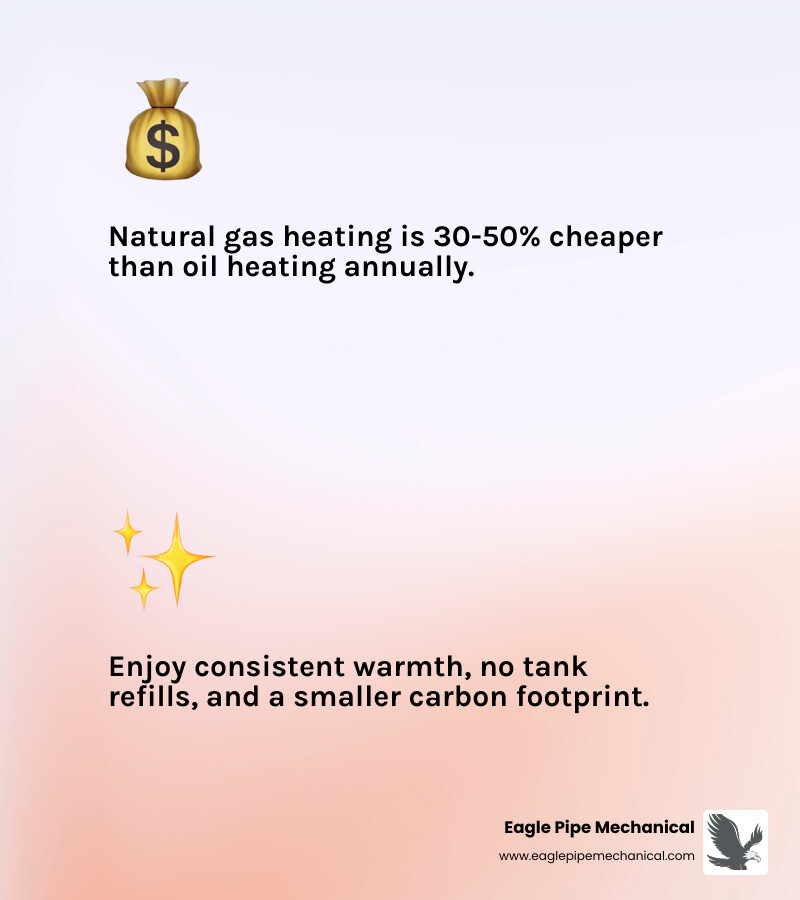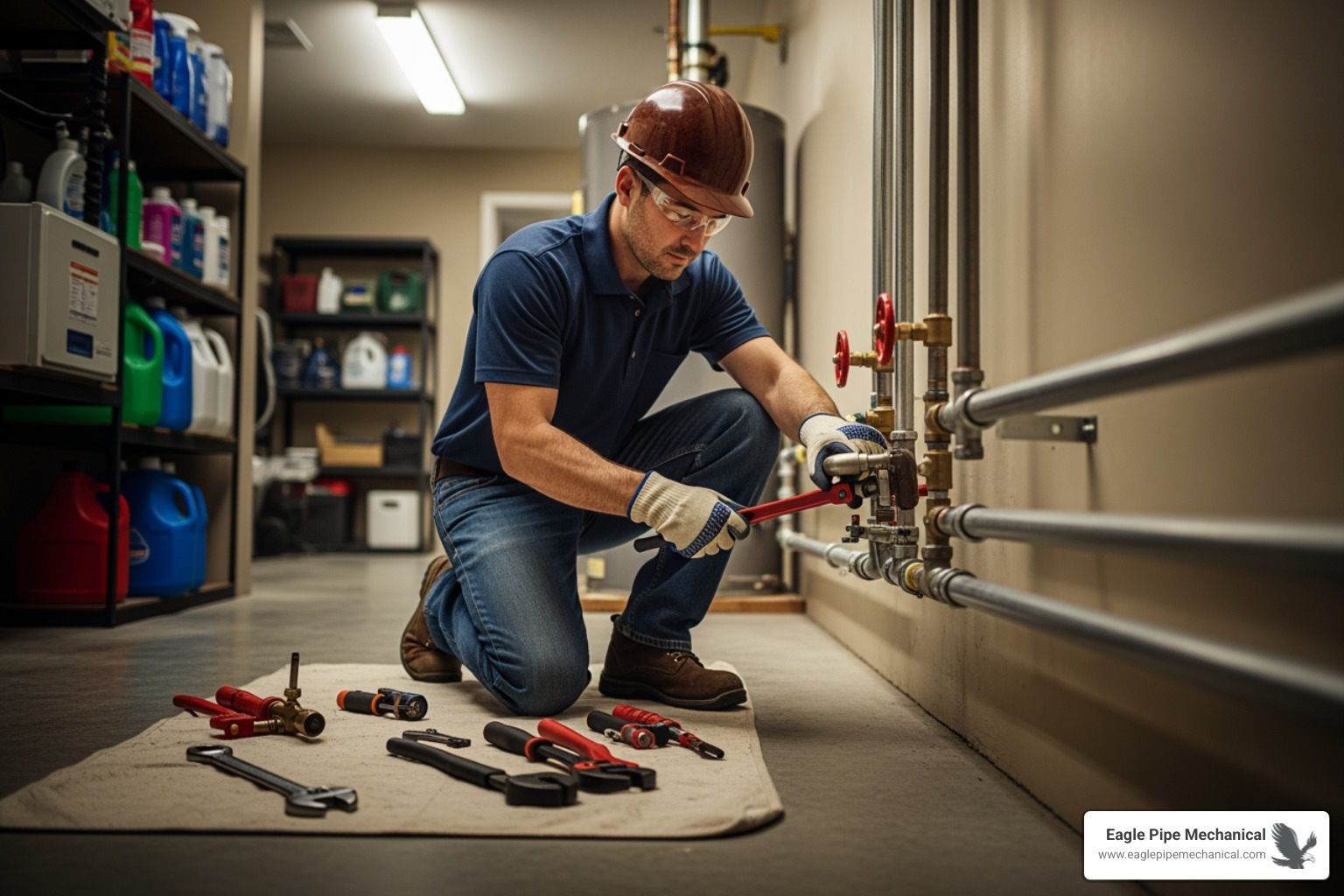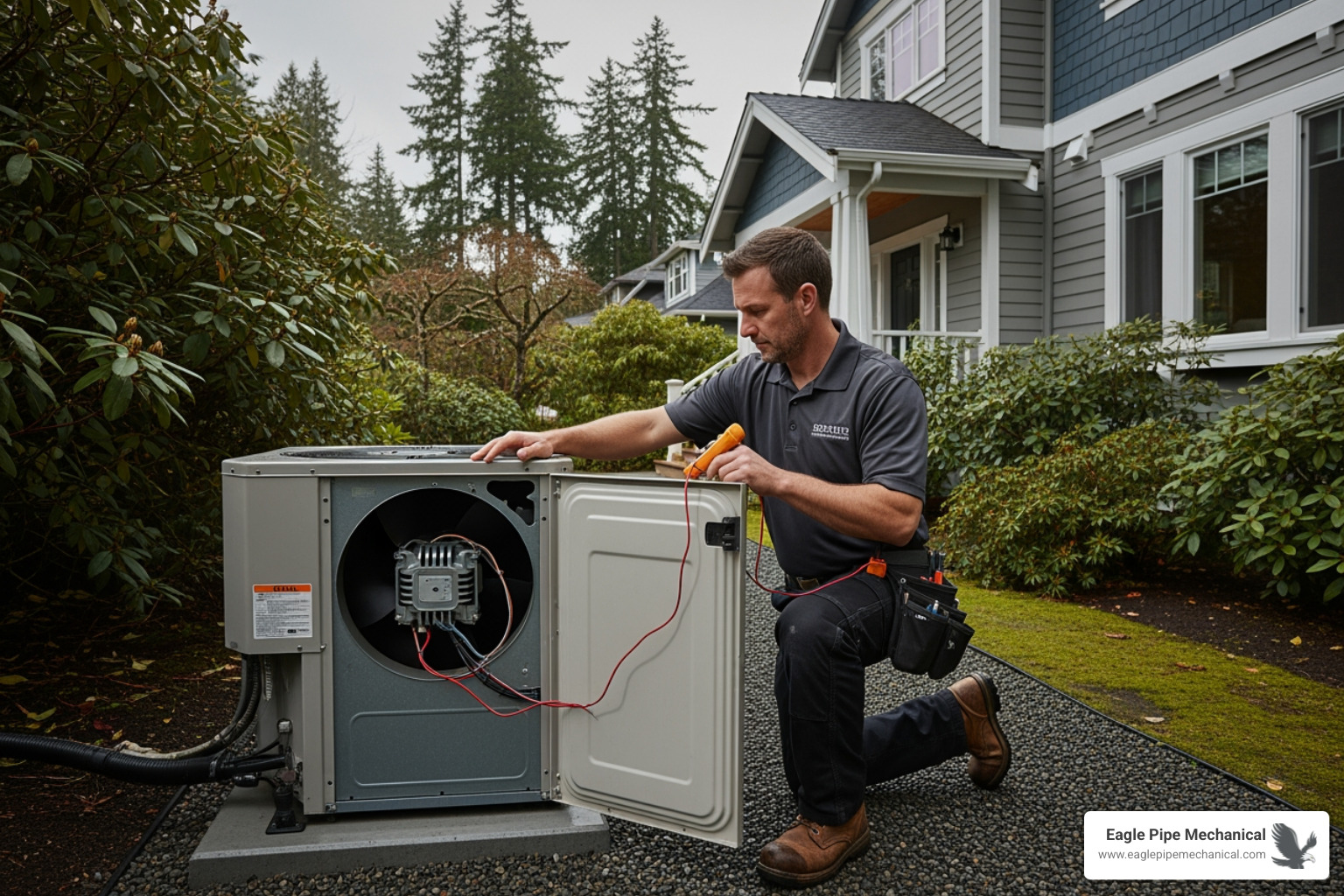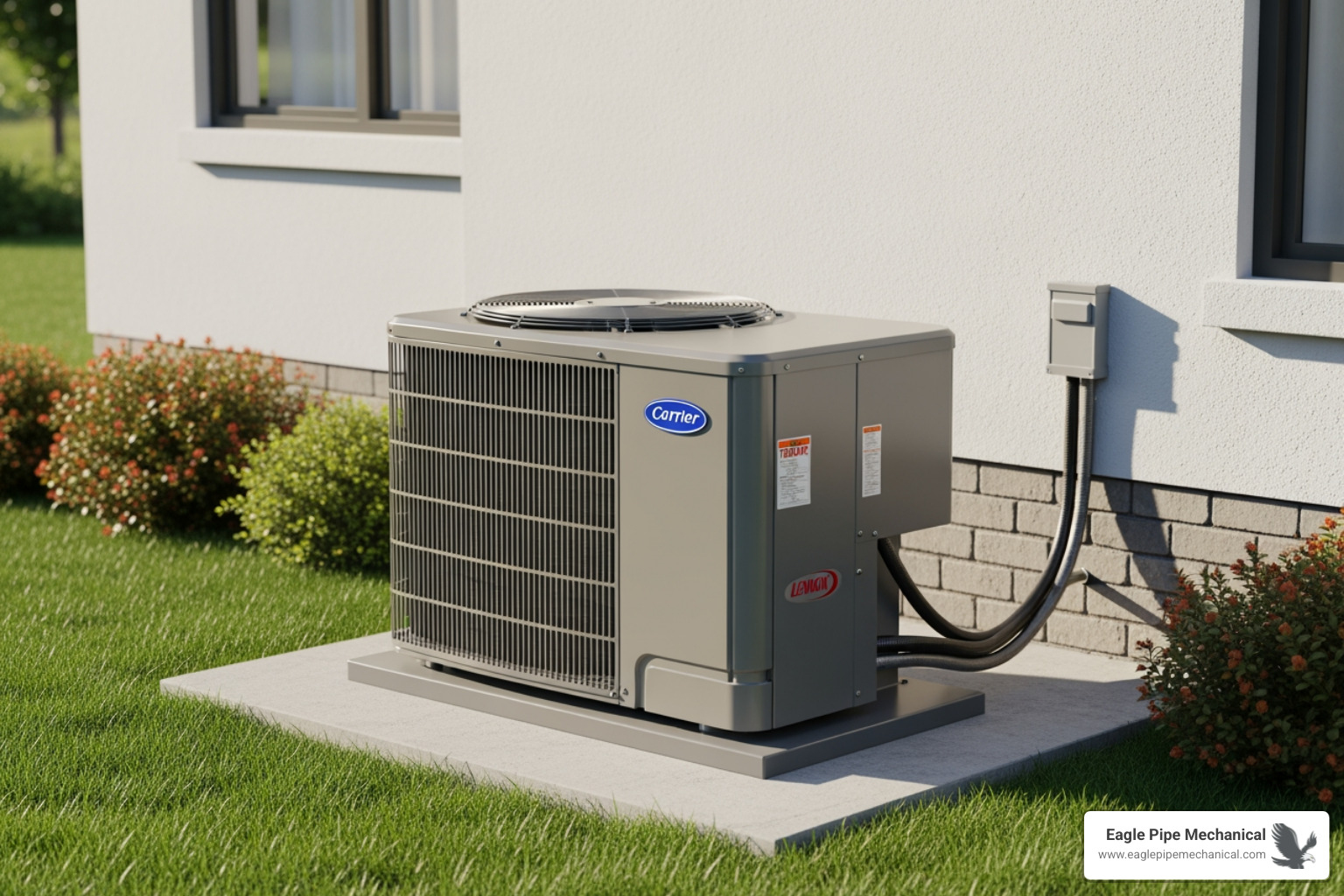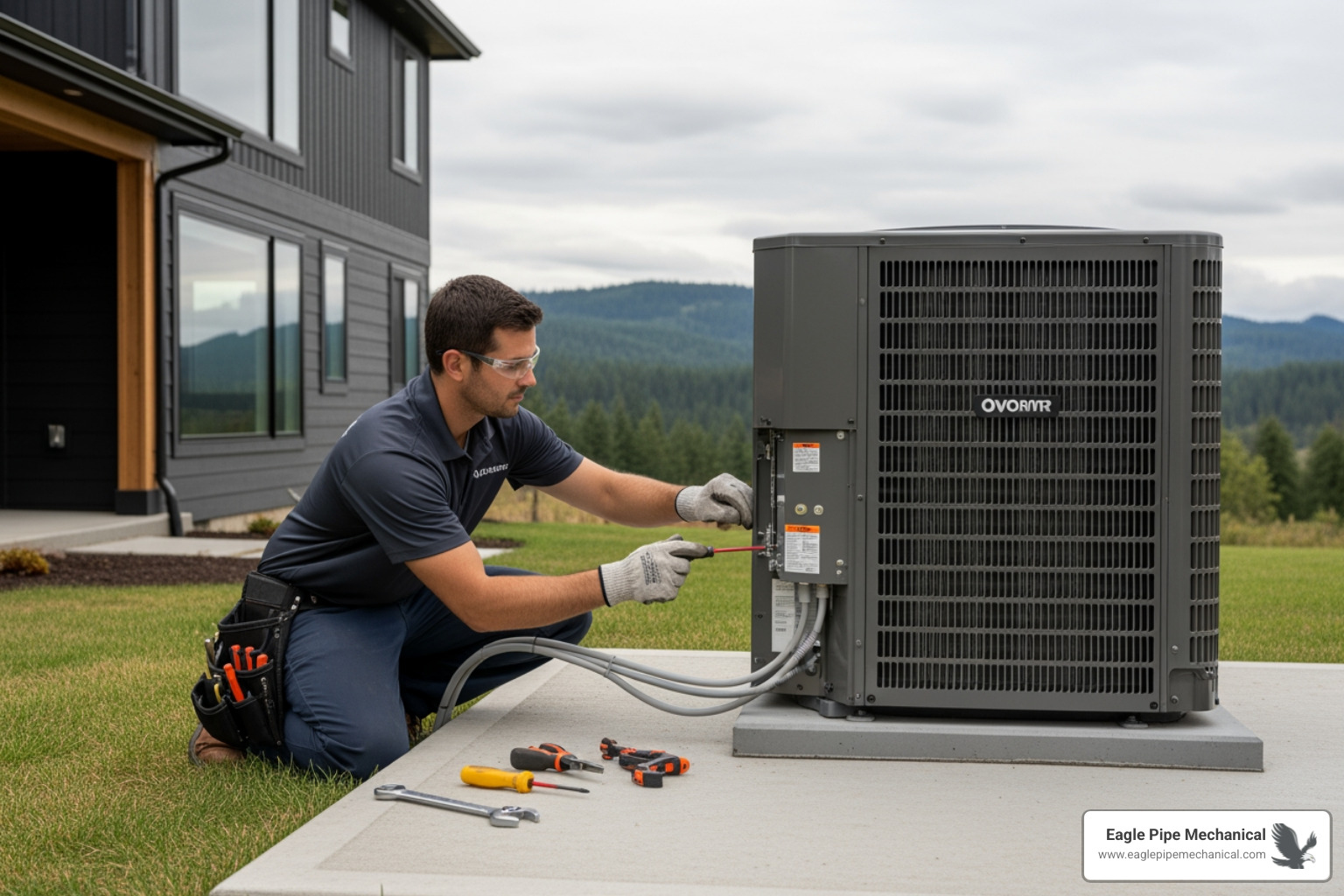Why Homeowners in Kitsap County Are Choosing Gas Conversion
Finding a qualified gas conversion contractor kitsap county homeowners trust is crucial when switching from oil to natural gas. If your oil furnace is aging, needs frequent repairs, or your heating bills are climbing, converting to natural gas can cut heating costs by 30-50% and improve home comfort and reliability.
Quick Guide to Finding Gas Conversion Contractors in Kitsap County:
- Look for licensed, bonded, and insured contractors with NATE-certified technicians
- Verify local experience in Kitsap County (Bremerton, Silverdale, Poulsbo, Bainbridge Island)
- Check for comprehensive services: gas line installation, furnace replacement, and permitting
- Read customer reviews from local neighbors
- Get transparent, written estimates before work begins
- Confirm they handle all required permits and inspections
If you’re exploring your heating options, learn more about gas line installation services or schedule a consultation for gas conversion.
Pacific Northwest winters demand reliable heating. Many Kitsap County homeowners still use oil heat, which has been 30-50% more expensive than natural gas annually since 2002. Oil furnaces require tank refills, take up space, and become less efficient over time. Gas conversion eliminates these issues, providing consistent warmth and lower monthly bills.
This guide covers when to switch, the conversion process, finding a contractor, and making smart choices about fuel and financing.
Is It Time to Switch? Benefits of Oil to Gas Conversion
Making a major change to your home’s heating system is a big decision. If you’ve been dealing with an aging oil furnace, rising heating bills, or the inconvenience of fuel deliveries, switching to natural gas might be the right solution. Many Kitsap County homeowners find that converting to natural gas not only solves these problems but also makes their home more comfortable and efficient.
Signs Your Oil Heating System is Ready for an Upgrade
How do you know when it’s time to say goodbye to your oil furnace? Sometimes the signs are obvious, but other times they are more subtle.
Age is often the first clue. Most oil furnaces last 15 to 20 years. If yours is approaching this age, it’s living on borrowed time and losing efficiency each year, meaning you’re paying more for the same amount of heat.
Frequent repairs are another red flag. If you’re calling a technician more than once a year, or if repair costs are nearing half the price of a new system, you’re throwing good money after bad.
Rising fuel costs hit hard with oil heat, which has cost 30-50% more than natural gas every year since 2002. If your bills keep climbing, your furnace is likely losing efficiency or oil prices are continuing to rise.
Uneven heating is more than an annoyance. When some rooms are cold while others are toasty, your furnace is struggling to distribute heat effectively as its components wear out.
Strange noises like banging, squealing, or rattling indicate that something inside is wearing out or breaking, often warning of bigger problems to come.
Visible rust or leaks around your furnace or oil tank are serious concerns. A cracked heat exchanger, for example, poses a carbon monoxide risk. If you see rust or smell oil, it’s time to call a professional.
When you notice these warning signs, contact a qualified gas conversion contractor Kitsap County residents trust to evaluate your options.
The Compelling Advantages of Natural Gas
Upgrading from oil to natural gas offers clear benefits for your home and your wallet.
Cost savings alone make most homeowners wish they’d switched sooner. With oil consistently 30-50% more expensive, converting can dramatically cut your heating bills. Over the life of your new furnace, these savings can pay for the conversion itself.
Efficiency is another game-changer. Modern natural gas furnaces achieve AFUE ratings of 90% to over 98%, meaning almost all the fuel you pay for heats your home. Compared to older oil systems at 60-70% efficiency, the difference is significant.
Environmental benefits matter in the Pacific Northwest. Natural gas burns cleaner than oil, reducing your home’s carbon footprint without sacrificing comfort.
Convenience might be the most underrated benefit. Imagine no more oil deliveries, no bulky tank, and no worries about running out of fuel. Natural gas flows continuously to your home. Gas furnaces are also quieter and don’t produce a strong oil smell.
Versatility opens up new possibilities. Once a gas line is installed, you can add a gas fireplace, an efficient water heater, a gas range, or an outdoor kitchen. Learn more info about gas line services and how they can improve your home.
The switch from oil to gas is an upgrade to your home’s comfort, efficiency, and convenience. With a trusted gas conversion contractor Kitsap County homeowners rely on, the process is smoother than you might think.
The Gas Conversion Process: What to Expect
Converting your home from oil to natural gas might sound like a major project, but with an experienced gas conversion contractor Kitsap County homeowners rely on, it’s a straightforward process. We’ve guided countless neighbors through this transition and can walk you through what to expect.
Step-by-Step Guide to Your Home’s Conversion
Your conversion begins with an initial consultation at your home. We’ll discuss your heating goals, assess your current oil system, and help you understand if natural gas conversion makes sense for you.
Once you move forward, we perform precise system sizing using a Manual J load calculation. This considers your home’s unique features to ensure your new furnace is perfectly sized for optimal efficiency and comfort—not too big or too small.
Next, we handle all permitting in Kitsap County. This is required for gas line and furnace work and ensures everything meets safety codes. We manage the entire process and coordinate all inspections.
Before installing the new system, we perform old system removal and oil tank decommissioning. We carefully remove your old furnace and properly decommission the storage tank according to strict environmental regulations.
Our expert technicians then install new gas piping to connect your home to the natural gas supply. We run lines to your new furnace and any other planned gas appliances, with safety as our top priority. You can learn more about our approach in our Safe Reliable Gas Line Installation guide.
With the gas lines ready, we install your new, high-efficiency natural gas furnace, making all necessary connections and calibrating the system for peak performance.
The final step is thorough testing and inspection. We pressure-test every gas line for leaks and verify the furnace is heating efficiently. We then coordinate with local inspectors to ensure everything meets Kitsap County’s stringent codes. Only when everything passes do we consider the job complete.
Project Timeline and Key Considerations
A straightforward furnace replacement with gas line installation typically takes 4-8 hours. More extensive piping may take longer, but most single-line installations are completed in one day.
Professional installation is crucial for gas systems. This is not a DIY project. Working with a qualified gas conversion contractor Kitsap County residents trust ensures your system is installed correctly, protecting your family and your investment.
Throughout the project, we protect your home and minimize disruption. Our crews maintain clean work areas and perform a thorough post-installation cleanup, leaving your home tidy and comfortable.
Finding the Right Gas Conversion Contractor in Kitsap County
When it comes to your home’s heating system, choosing the right gas conversion contractor Kitsap County residents rely on is paramount. You’re looking for a partner who will ensure your family’s comfort and safety for years to come.
Essential Qualifications for a Kitsap County Gas Conversion Contractor
We encourage homeowners to do their homework. The right contractor should check these essential boxes:
- Licensed, Bonded, and Insured: This is your protection. A license proves proficiency, a bond protects you if the job isn’t completed as agreed, and insurance covers accidents or damage.
- NATE Certification: North American Technician Excellence (NATE) is the industry’s leading certification for HVAC technicians. NATE-certified technicians have proven their knowledge and skills through rigorous testing.
- Local Experience: A contractor with deep roots in Kitsap and Jefferson Counties—covering communities like Bremerton, Silverdale, and Bainbridge Island—understands our local climate, building codes, and permitting requirements.
- Positive Customer Reviews: Online reviews offer real-world insights into a contractor’s reliability and quality of work. A consistent track record of satisfied customers throughout Kitsap County speaks volumes.
- Transparent, Written Estimates: A reputable contractor provides detailed documentation outlining all costs, materials, and labor. Be cautious of vague estimates or high-pressure tactics.
Beyond the Furnace: Additional Services to Look For
Once you bring natural gas to your home, you open up a world of possibilities. A comprehensive contractor can help you maximize this investment.
Look for contractors who offer expertise in gas piping installation and modification for other applications. This includes a cozy gas fireplace, an efficient gas water heater (including tankless models), or an outdoor BBQ grill or fire pit. You might also consider upgrading to gas appliances like dryers or ranges.
For peace of mind during power outages, a gas-powered generator is a great option. In our earthquake-prone region, contractors who install seismic shut-off valves demonstrate a commitment to your long-term safety.
Finally, don’t overlook maintenance plans. Regular professional maintenance ensures your new furnace operates efficiently for its entire 15-20 year lifespan. A contractor who offers ongoing service is committed to a long-term relationship.
At Eagle Pipe Mechanical, we provide this full suite of services to make your home as comfortable, efficient, and safe as possible.
Understanding the Costs, Rebates, and Fuel Choices
Let’s talk about the practical side of converting to natural gas—what it costs, how to make it more affordable, and which fuel option makes the most sense for your home.
Budgeting for Your Conversion: Costs & Financing
The overall investment for switching from oil to gas depends on several factors:
- The type and efficiency of your new furnace: High-efficiency models cost more upfront but deliver greater long-term savings.
- Installation complexity: Extensive new gas piping requires more labor and materials.
- Your home’s size: Larger homes require furnaces with higher BTU outputs.
- Additional gas appliances: Connecting other appliances adds to the scope, but doing it all at once is often more cost-effective.
The good news is that converting to natural gas typically pays for itself through substantial savings on your heating bills—that 30-50% difference adds up every month.
Even better, you don’t have to cover all the costs alone. Utility rebates from local gas providers and federal tax credits for energy-efficient home improvements can help offset the expense. We stay current on available programs and can help you identify any you qualify for.
If you’re concerned about the upfront investment, we offer flexible financing options that let you spread the cost over manageable monthly payments. After a thorough assessment, we’ll provide a transparent, written estimate with no surprises.
Natural Gas vs. Propane in Kitsap County
While this guide focuses on natural gas, it’s worth understanding the difference between it and propane.
Natural gas arrives at your home through underground utility pipelines, making it the go-to option for residents in areas like Bremerton, Silverdale, and Bainbridge Island. It’s convenient, requires no storage tank, and is generally the most affordable option.
Propane is delivered by truck and stored in a tank on your property. For homes in more rural parts of Kitsap and Jefferson Counties where natural gas lines aren’t available, propane is an excellent alternative to oil. It’s cleaner-burning and more cost-effective than oil, though typically more expensive than natural gas.
Both fuels are highly efficient. The right choice depends on your location. If natural gas is available, it’s the most convenient and economical option. If not, propane is still a major upgrade from oil. We work with both and can help you determine the best solution.
Frequently Asked Questions about Gas Conversion
We’ve helped Kitsap County homeowners switch from oil to gas for years, and certain questions come up often. Here are answers to what’s likely on your mind.
How long will my new gas furnace last?
With proper installation and regular care, your new gas furnace should last 15 to 20 years. The key to reaching that full lifespan is professional installation and consistent maintenance. A correctly sized and installed furnace runs more efficiently with less wear and tear.
We also strongly recommend annual professional tune-ups. During these visits, we clean and inspect your system, catch small issues before they become expensive repairs, and keep your furnace running at peak performance. It’s a small investment that protects your larger one.
Do I need a permit for a gas conversion in Kitsap County?
Yes, permits and inspections are required for gas line installation and furnace replacement in Kitsap County. These regulations exist to protect you by ensuring all work meets local building codes and safety standards.
The great news is that when you work with a qualified gas conversion contractor Kitsap County homeowners trust, you don’t have to worry about the paperwork. We handle all necessary permitting and coordinate with local inspectors from start to finish.
How do I maintain my new gas system for safety and efficiency?
Maintaining your new gas system is simple and makes a big difference in safety and longevity.
- Change your furnace filter every 1 to 3 months. A clean filter ensures your system breathes properly and runs efficiently.
- Schedule annual professional tune-ups. A technician will clean and inspect your furnace, check connections, test safety controls, and verify that every component is working as it should.
- Keep the area around your furnace clear of boxes, cleaning supplies, or flammable materials to ensure good airflow.
- Stay alert to warning signs. If you smell gas (like rotten eggs), hear unusual sounds, or notice performance issues, take it seriously. If you suspect a gas leak, evacuate your home immediately and call your gas utility or 911 from a safe location. You can learn more by visiting our guide on how to Identify Gas Line Safety Concerns.
Your Partner for a Warm and Efficient Home
Making the switch from oil to natural gas is one of the smartest investments you can make for your Kitsap County home. The benefits—30-50% cost savings, dramatically improved comfort, and a reduced environmental footprint—add up to a real difference in your daily life.
Your new natural gas system brings more than just warmth; it opens up possibilities for a gas fireplace, range, or standby generator, making your home more versatile and valuable. Of course, these benefits depend on choosing the right gas conversion contractor Kitsap County homeowners trust.
We have served our neighbors across Kitsap and Jefferson Counties for years—from Bremerton to Poulsbo, Silverdale to Bainbridge Island. At Eagle Pipe Mechanical, you get a partner who explains things clearly, respects your home, and stands behind their work. We handle everything from permits to cleanup, so you can focus on enjoying your newly comfortable home.
Ready to say goodbye to expensive oil deliveries and hello to reliable, efficient natural gas heating? Our team is here to answer your questions and provide transparent guidance. We’re committed to providing you with Safe Gas Line Installation Services and the expert support you need. Your comfort is our priority.

